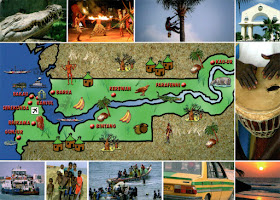Located
in West Africa, mostly surrounded by Senegal with a short strip of its
coastline bordered with the Atlantic Ocean at its western end, the
Gambia is the smallest country on mainland Africa. It is practically a
narrow strip of land along the Gambia River, on either side of it, with
less than 48km wide at its widest point, its borders following the
meanders of the river. Its capital is Banjul (founded in 1816 by the
British as a trading post and base for suppressing the slave trade), and
the largest cities are Serekunda and Brikama.
In
1588, the claimant to the Portuguese throne, António, Prior of Crato,
sold exclusive trade rights on the Gambia River to English merchants.
During the late 17th century and throughout the 18th century, the British Empire and the French Empire struggled continually for supremacy
in the region, until finally the British occupied the Gambia in 1758.
As many as three million slaves may have been taken from this general
region during the three centuries that the transatlantic slave trade
operated.
In
1807, the british abolished the slave trade throughout empire. In 1888,
The Gambia became a separate colony. An agreement with the French Republic in 1889 established the present boundaries (about 16km north
and south of the Gambia River), and Gambia became a British Crown
colony. In 1965, it gained independence, and since then it has had two
leaders: Dawda Jawara (1970-1994, and Yahya Jammeh (which seized power
in a coup as a young army officer).
About the stamp
The stamp is part of the series Musical Instruments of the Manding Empire, about which I wrote here.
References
The Gambia - Wikipedia
Sender: Dauda Mane
Sent from ??? (Gambia), on 20.12.2014


No comments:
Post a Comment